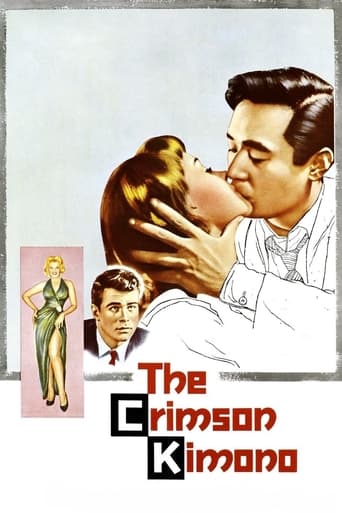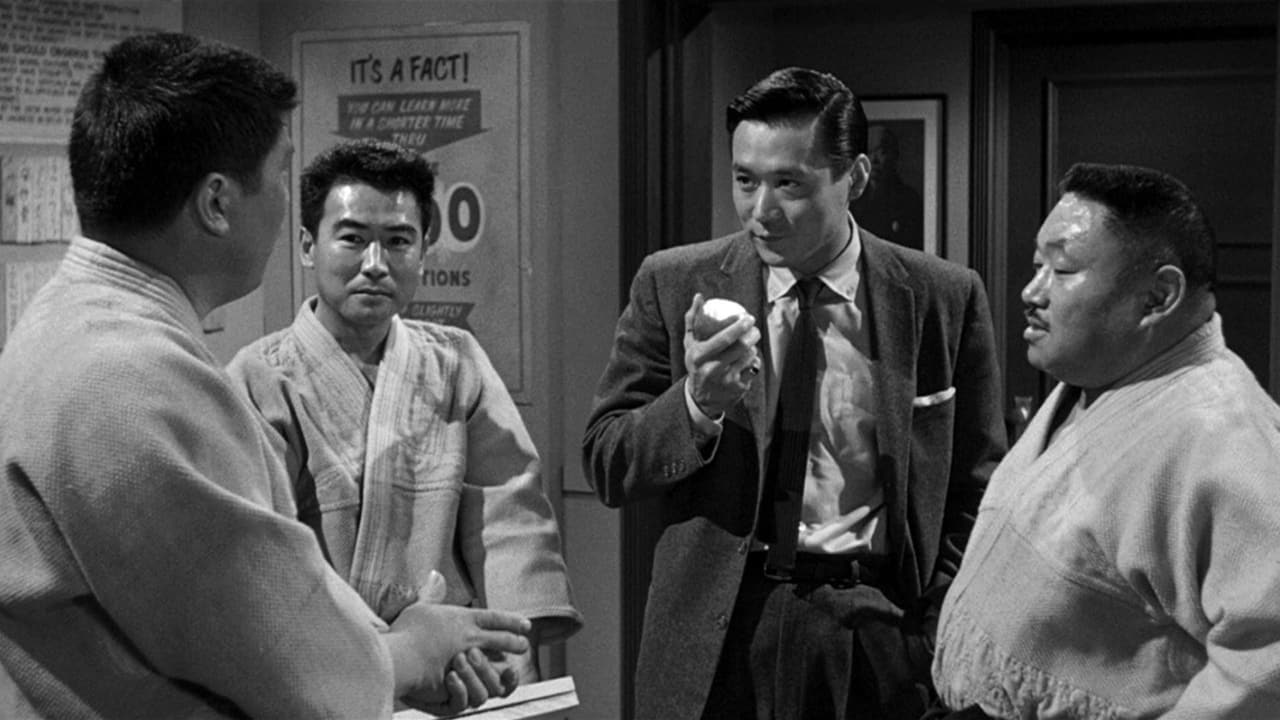Dalbert Pringle
Favorite movie quote - "Because you're a meat-head, that's how!" As is the case here with The Crimson Kimono (TCK for short), there are just some Crime/Thrillers out there (especially from the 1950s) that are so hilariously bad that, yes, they're almost good.From its cheap, lurid sleaziness, to its truly terrible violence, to its pure brain-dead dialogue, to its absolutely amateurish direction (courtesy of Samuel Fuller), this film was a literal laugh-riot of some of the most outrageous examples of second-rate movie-making that I've seen in a mighty long time.I mean, things got so downright wacky in TCK's story that during Homicide's investigation into stripper, Sugar Torch's dumbfounding murder, handsome Detective Bancroft actually flashed a photo of the suspected killer to potential witnesses while holding said picture upside-down. (Ha! Spare me!) I guess this was his way of seeing if anyone was really paying attention.With its totally uncool ambiance (set on the gaudy side of L.A.) TCK scraped the absolute bottom of the inter-racial barrel by injecting into its already tangled & mangled story a scorching-hot romance between a Japanese man (a cop) and a Caucasian woman (an artist). (Ooh! How scandalous!) On all counts, TCK absolutely killed me with its utter ineptitude. But, hey, that's exactly where all of its low-budget, one-dimensional charm stemmed from. And, I wouldn't have had it any other way!
JohnWelles
"The Crimson Kimono" (1959), directed by "cult" filmmaker Samuel Fuller, comes from the tail end of the film noir period; a year later it would have been classed as a neo-noir. As it is, it's an excellent little thriller, well acted and bolstered by a particularly good script, courtesy of Fuller himself.This screenplay is also among the oddest in the dark world of noir: after an exhilarating opening scene detailing the killing of burlesque queen Sugar Torch, the story of the hunting down of the murder takes a backseat to a (for then) ground breaking inter-racial love triangle, with American LAPD cop Charlie Bancroft (Glenn Corbett) and Japanese LAPD Detective (James Shigeta) falling for Christine Downes (Victoria Shaw). There is no negative stereotypes here and of the three Shigeta gives the best performance, however all the acting is to an admirably high standard, as is Fuller's characteristically brilliant use of long takes, aided by Oscar winning cameraman Sam Leavitt.Fuller's movies always had an extra vibrancy to them, and this no different with surprisingly modern feeling editing by Jerome Thoms and sharp direction. A classic noir that deserves to be as well as known as Fuller's other crime greats, this one not to miss.
Spikeopath
The Crimson Kimono is written, produced and directed by Samuel Fuller. It stars Glenn Corbett, James Shigeta, Victoria Shaw & Anna Lee. Cinematographer is Sam Leavitt and the music is by Harry Sukman. Plot is about two L.A. cops, Joe Kojaku (Shigeta) & Charlie Bancroft (Corbett), deep friends of a different race, bonded by blood who met during the Korean War. When stripper Sugar Torch (Gloria Pall) is shot and killed, the two men's investigation sees them follow a painting to the artist who painted it, Christine Downes (Shaw). It's the start of a love triangle that could have far reaching consequences for not only the investigation, but also Joe, Charlie & Christine.1959 saw the release of Douglas Sirk's Imitation of Life, a much talked about movie, that whilst splitting the critics down the middle, was none the less the fourth biggest earner at the box office that year. Sirk's film, amongst other things, had a racially charged thread in it that gave it some added potency. The Crimson Kimono also had a racially charged thread running thru it, but Samuel Fuller's film, it seems, slipped under the radar. Now of course in the modern era of film, Sam Fuller is often name checked by the likes Scorsese & Tarantino as being an influence, while the French New Wavers were quick to laud him as a stylistic influence too. The Crimson Kimono is far from being Fuller's best work, but it is unmistakably a Fuller movie, and one that is a must see for those of a noir/hard-boiled persuasion.Fuller has managed to put a murder mystery at the core of his film and wrap around it a tale of inter-racial tolerance, jealousy and sexual confusion: set deliciously to the backdrops of an urban part of L.A. and the more cosmopolitan Little Tokyo. As he weaves his vision together, never once hitting the viewer over the head with its messages, Fuller neatly plays around with his camera. Up close and personal to his actors, sweeping alongside for walk sequences and scatter-gun shooting for his action scenes (a Kendo fight is an action high point). It's thoughtful film making, the camera puts us in with the story and no scene is wasted, it's all relative, particularly as tensions start to rise between the two best friends and the case starts to unfold.The principal actors are not big names, but all are very credible, and the lack of star power actually benefits the piece by keeping the narrative grounded. While the supporting Anna Lee (How Green Was My Valley) as an alcoholic mother figure type is a joy to watch. Sam Leavitt's (Anatomy of a Murder/The Defiant Ones) photography has it just right, the black & white has a stark look for the street exteriors and the interior focus has that hue of character importance about it. Harry Sukman's music is also worthy of mentioning, blending jazzy beats with oriental flavors, it's well in keeping with the nature of the story.Although there's no cop out in the finale, in fact it's an important and affecting finish as regards the characters, the murder mystery angle close down is a little unfulfilling in context to the mood that has overall been built up. But it's no deal breaker and doesn't detract from what a very good movie The Crimson Kimono is. 8/10
blanche-2
Sam Fuller directed "The Crimson Kimono," starring Glenn Corbett, James Shigeta, Victoria Shaw and Anna Lee, and this 1959 film is not your usual detective noir. Corbett and Shigeta are Charlie Bancroft and Joe Kojaku, buddies from the Korean war and now partners in the LA Police Department, who investigate the death of a stripper. In the course of that investigation, they meet a beautiful artist (Shaw) and both men fall for her; she in turn falls for the gentle and intelligent Joe. This tests the relationship of the two men, and when Joe sees Charlie's reaction, he assumes it comes from Charlie's latent racism.This is an odd film, not as good or as well done as Fuller's Pickup on South Street, but good nonetheless. Part of its success is due to the persona and performance of James Shigeta, for a time one of the biggest Asian-American stars ever. "The Crimson Kimono" was the first feature film for both Shigeta and Corbett, and they handle their assignments well. Fifty years later, Shigeta is still working; Corbett worked steadily until his death in 1993. Anna Lee is on hand giving a vigorous performance as an alcoholic artist; the late Victoria Shaw is beautiful but doesn't register much as Chris, the love interest of both men.There are a couple of problems with this ambitious script, one being Joe's claim that he had never experienced racism. That's impossible if he was in California when World War II broke out; it's a naive statement he wouldn't have made. The other problem is that all of the love connections seem instantaneous, though that seems to be a very "noir" thing. Nevertheless, the story holds interest, the performances are good, the atmosphere authentic, and Sam Fuller always has something to say, if only we'd listen



 AD
AD




